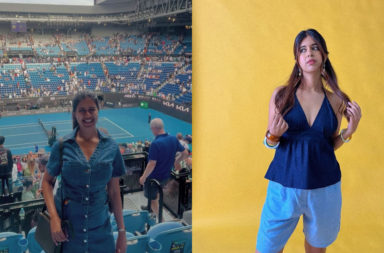“Never Have I Ever” is a coming-of-age comedy-drama series created by Mindy Kaling and Lang Fisher. It follows the story of Devi Vishwakumar, a first-generation Indian-American teenager living in California, as she navigates the ups and downs of high school while dealing with family, friendships, and her own personal growth. The show revolves around Devi’s quest to improve her social status while tackling various themes such as cultural identity, grief, friendship, love, and the challenges of adolescence. While the show is great for its characters, storyline and screenplay, the highlight for us is Devi, who is all parts relatable.

Devi is one of those characters who are not perfect but even with all her imperfections, she is extremely lovable. With the 4th season ruling Netflix, we thought why not reiterate the reasons why we absolutely love Devi for who she is and how she feels like an extended part of ourselves.
Listing all the reasons why Devi from Never Have I Ever is Relatable Max
Cultural Identity
Devi is an Indian-American teenager who struggles with balancing her Indian heritage and American upbringing. This conflict resonates with many individuals who come from multicultural backgrounds and face similar challenges in reconciling. Not just Indian- American but many of us who have also moved from towns to metropolitan cities find it challenging balancing the lavish with the humble.
Also Read: YouTube rolls out a new feature “#ShortsFriends”
Flawed but Lovable
Devi is far from perfect, and her flawed nature makes her relatable to many of us. She makes mistakes, behaves impulsively, and faces consequences for her actions, which reflects the reality of being a flawed human being. Despite her imperfections, viewers root for her and see themselves in her character.
Awkward Social Situations
Devi often finds herself in hilariously awkward social situations that many of us can relate to. From embarrassing encounters with crushes to unintentional blunders in front of friends and family, her social mishaps provide moments of laughter and relatability.
Overthinking and Overanalysing
Devi has a tendency to overthink and overanalyse almost everything, from her relationships to her schoolwork. This constant overthinking often leads her to make impulsive decisions or say things she later regrets, which many of us can relate to when we find ourselves in similar situations.

Clumsiness
Devi’s clumsiness is a recurring comedic element throughout the series. Whether she’s tripping over her own feet or accidentally knocking things over, her unintentional mishaps create funny and relatable moments for us viewers who have experienced their fair share of clumsy moments. In all honesty, isn’t it all of us?
Family Dynamics
Devi’s interactions with her family, particularly her arguments with her mother, are both amusing and relatable. Many viewers can identify with the sometimes turbulent but ultimately loving relationships between family members and the hilarity that arise from these dynamics.
The School Situation
Like many teenagers, Devi experiences the ups and downs of school life. From navigating challenging classes to dealing with strict teachers, her humorous encounters with academia resonate with anyone who has faced similar academic hurdles. To be honest, watching Never Have I Ever takes us back to our school days and reminds us of adventures, or should we say, misadventures.
Pop Culture References
Devi frequently makes references to popular culture, whether it’s referencing movies, TV shows, or celebrities. These references add a humorous layer to the show and make Devi relatable to viewers who share her love for the pop culture and all things trending.
Friendships and Peer Pressure
Devi’s friendships and the peer pressure she faces are portrayed in a funny and relatable way. From trying to fit in with different social groups to navigating the complexities of teenage friendships, Devi’s experiences highlight the universal challenges many young people face during their formative years and through a major part of their lives.
Overall, Devi’s relatability stems from her flaws, vulnerabilities, and the humorous situations she finds herself in. These relatable aspects of her character allow viewers to connect with her and find humour in their own similar experiences. In the season finale, Devi has been shown as a character who has her mess together, giving us hope for our own happy endings.


